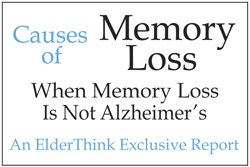
 |
The Diagnosis of Alzheimer's Can Be TrickyBy Gretchen Heuring | 07.25.2014 |
At Some Stages This Disease Mimics Other Causes of Memory Loss
Diagnosing Alzheimer's requires a careful evaluation. It's important to rule out other possible (and more easily treatable) causes of memory loss.
Prepare For Your Doctor Visit
The doctor will ask a lot of questions about your health. You may have answered many of these questions before but it is truly important to patiently answer them again. Recalling dates (approximate dates are ok) of surgeries and hospital stays will help. Actually, any trauma could be important, including loss of a loved one, an injury, or a fall. It's a good idea to bring a list of meds, vitamins, and supplements that you take. Some drug interactions and vitamin deficiencies can cause symptoms similar to Alzheimer's and such symptoms can be reversed.
You will probably be asked about the health of your parents. Alzheimer's Disease is not always inherited but it can be.
Exams and Tests
Besides a thorough medical history, your doctor will suggest some exams and tests. You may be referred to specialists for some of these. They could include a mental status testing, a thorough physical exam, and a neurological exam.
Other tests could include brain imaging and blood tests. These could be chosen to rule out other possible causes of memory loss.
What To Expect
Though each person is different, there are seven identifiable stages as the disease progresses. The first stage, known as "mild cognitive impairment" may hardly be noticeable. Often close friends and family notice this change before the affected person notices. This stage can last for months or even years.
So it's possible that your doctor may not be able to identify the changes that your loved ones have experienced in you. That's why tests are so important. Retesting over time can help identify symptoms. Those symptoms can be treated with medications that make living more normal and comfortable.
A Mayo Clinic doctor describes the diagnosis of Alzheimer's Disease in the video below.
In this video, Dr. Ronald Peterson says: "At the Mayo Clinic, we have the chance to observe former President Reagan's doctor evaluate two patients who struggle to understand the earliest signs of cognitive impairment. This film highlights the importance of distinguishing among the various dementias that can occur with aging." |






